I know, it’s very late, but I’m still catching up post-broken finger.
Oof but July was a month. Great books and lots of them. Some chunksters too, but then we had a two week holiday with a fair bit of train travel and I love reading on long train journeys.
The Garden of Evening Mists, Tan Twan Eng
I read Tan Twan Eng’s The Gift of Rain around 14 years ago. My review is here. It was a sweeping and sumptuous epic. I enjoyed it but did criticize it for every character being a bit too amazing.
Here a retired Chinese-Malaysian judge returns to her childhood home. This sparks memories of the period shortly after the second world war where as a young woman she controversially became the apprentice to an exiled Japanese master gardener. He later disappeared, possibly killed by communist guerrillas, possibly in an accident, possibly who knows how?
Like Gift it’s a dense rich soup of a novel. There’s history, big characters, cross-cultural tensions. Also like Gift there’s a slight tendency for all the characters to be larger than life, but even so I really enjoyed this and as the autumn nights roll in it would make a good novel to escape into on darker evenings.
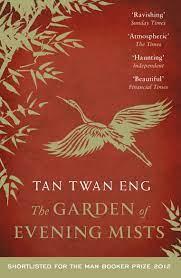
The Day of the Owl, Leonardo Sciascia (translated by Arthur Oliver)
I read this out in Italy. A man is shot and killed in a Sicilian piazza as he runs for a bus. Nobody sees anything. Not the passengers, the driver, the people in the square. Everyone just happened to be looking the other way, which doesn’t make the investigating mainland policeman’s job particularly easy…
It’s a short and easy read and it brings out nicely how organised crime can stifle a place. It won’t make my end of year list but definitely worth reading if it sounds of any interest. Kimbofo did a good writeup of it here.
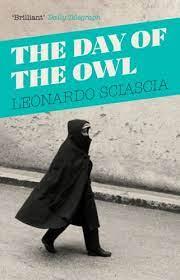
The Leopard, G.T. di Lampedusa (translated by Archibald Colquhoun)
Now this, this will make my end of year list. Simply brilliant. A profound examination of the decline of a culture through a single family. It’s another rich read here of an 1860s Sicilian prince whose family’s diminishing fortunes reflect those of the wider aristocracy and old regime. It’s exceptionally well written and incredibly evocative of Sicily (which I can swear to that because that’s where I read it).
There’s a good review of this at Beauty is a Sleeping Cat here. Caroline captures my own surprise not at how good this is (everyone told me that) but how subtle and varied it is too.
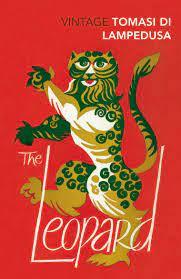
Black Narcissus, Rumer Godden
So I said it was a strong month. A group of Anglican nuns go to found a convent in remote Himalayan mountains where a group of monks previously failed. Their internal tensions threaten to tear them apart, but even more so the unforgivingly vast and inhumanly beautiful landscape. Outsiders do not prosper here.
There’s something quite special in conjuring up such a sense of space yet at the same time making it claustrophobic. Each of the characters is well captured as are the dynamics between them. An exceptional novel. Jacqui did a good write up of it here which prompted me to finally read it. Recommendations for further Godden to try would be very welcome.
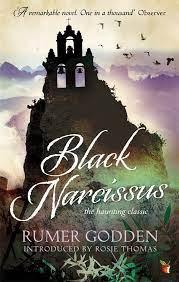
The Locked Room, Sjöwall & Wahlöö (translated by Paul Britten Austin)
A battered Martin Beck and an increasingly politicised and incompetent Swedish police force investigate a bank robbery and a literal locked room mystery. A man found dead in a room locked from within has been shot in the heart. There’s no weapon at the scene so how did it happen? Suicide is the initial police ruling, but Beck unsurprisingly finds that a bit unlikely in the absence of a gun. The tone is darker than before and it’s perhaps not as easy a read as some in the series, but still satisfying.
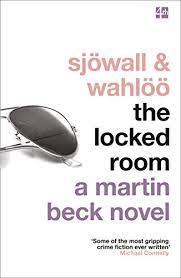
Ride the Pink Horse, Dorothy B. Hughes
One of Jacqui’s recommendations (here) and a blisteringly good one. Three men come south from Chicago to Santa Fe during its annual fiesta. Two of them are separately chasing the third. What follows is as black a noir as any I’ve read.
Sailor is a thug formerly on the payroll of a corrupt senator. He’s intent on getting the payoff he thinks he deserves. The Senator is also being chased by a Chicago cop who hopes he can turn Sailor and bring out the good man he believes is buried deep under Sailor’s violence and pride. It’s an explosive mixture and Hughes deserves a much higher profile than she has. I’m writing this over two months after reading it and it’s still burned into my mind. Brilliant.
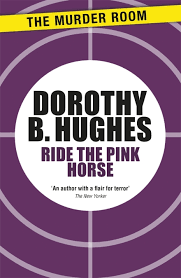
The Water Knife, Paolo Bacigalupi
A climate-change inspired SF novel in which cities in the Southern US wage semi-legal resource wars with each other and the cartels all fueled by the collapse of water supplies. Water rights are power. (Chinatown sequel The Two Jakes explores a similar theme.)
The McGuffin is a water right that ranks ahead of all others, giving legal priority that can be backed up by violence and sabotage. That’s all fine and the politics of water shortages is a genuine real-world issue that really could get very nasty indeed, but for me the novel was let down by the degree to which it absolutely wallows in horribly detailed descriptions of torture, sexual violence and murder. It all became a bit too relentless. I bailed before the end.
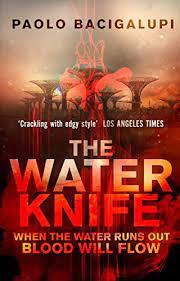
Foster, Claire Keegan
Novels from a child’s point of view are very hard to pull off. Here Keegan makes it look effortless. This is a beautiful novel about a young girl sent to live with childless relatives when her own family’s new baby arrives.
What emerges is a portrait of neglect seen through the girl’s wonder at her new home and temporary parents. There’s an examination too of community and of the lives of the couple who’ve taken her in and much more besides. It’s extraordinary and I can’t recommend it too highly. Radhika wrote a tremendous review of this here which captures the complexity and depth this packs into so few pages. Sadly the cover misleadingly makes it look like a misery memoir.
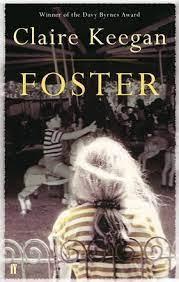
Petulia’s Rouge Tin, Su Tong (translated by Jane Weizhen Pan and Martin Merz)
This is an interesting one. It’s a fairly short novella published in ebook form by Penguin Australia. We’re in 1950s Shanghai and the state has just closed down the Red Delight Pavilion brothel, sending the women from it for work reeducation.
Petulia ends up in a factory (which isn’t as bad as the phrase work reeducation suggests, though it’s a lot less comfortable than the brothel was). Her friend Autumn Grace gets away and sets up with an old customer. The book then follows their lives over the years.
It’s very well done. In under 80 pages it creates a world I’ve no personal familiarity with (beyond other Chinese books and films) and it nicely contrasts the clash of cultures between old and new China as well as the flawed humanity of the former prostitutes compared to the Puritanism of the Communist women ‘reforming’ them and a nearby convent of Buddhist nuns. Worth looking out for.
If it does catch your interest there’s a very good review of at the Cha Review of Books and Films here. The review does pretty much tell you the whole plot but it’s not a plot driven novel and the review also provides some context and analysis which I found fascinating.
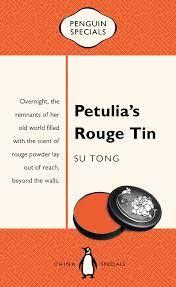
Bonjour Tristesse, Françoise Sagan (translated by Heather Lloyd)
A reread, but in a different translation. I previously read the acclaimed Irene Ash translation (review here). This time I tried the recent but perhaps more controversial Heather Lloyd.
Lloyd has been criticised for lacking some of the elegance and sparkle of the Ash. However, Lloyd’s is seen as more accurate than the Ash. It’s that classic translation dilemma of how to balance fidelity to text against fidelity to spirit.
Having read both and looked at a French copy to compare with the original it’s clear to me that Lloyd is more faithful to the French. Ash omits sentences, sometimes paragraphs, and sometimes changes meanings too. It’s not massive but it runs through the book. Ash also heavily edits the sex scenes.
I still love the Ash, but my view now is that Ash acted both as translator and as editor, adapting the original to an English readership who would be less comfortable with some of the original content.
So which should you read? Both, obviously, they’re not that long and the comparison is interesting. Jacqui wrote a fuller review of the Lloyd Bonjour here and wrote a bit on the translation here.
A Certain Smile, Françoise Sagan (translated by Heather Lloyd)
Penguin generously put two Lloyd translations in a single volume so I carried on to (re)read A certain Smile. My review of the Ash is here. I liked it a bit less this time, though whether that’s the translation or simply the effect of reading it back to back with Bonjour is hard to say. I suspect the latter to be fair to Lloyd.
Again the Ash translation is leaner but less accurate. Having now read the Lloyd translations I think they’ve got a bit of unfair stick. It’s not Lloyd’s fault that people’s impression of Sagan is founded on slightly inaccurate translations and there is real value in more accurate ones. On the other hand, the Ash translations are still a lot of fun. There’s room for both.
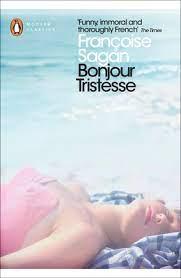
And that’s it! August was also a packed reading month, but September was much quieter. Now my finger is pretty much recovered I’m hoping to get those updates up before too long.
